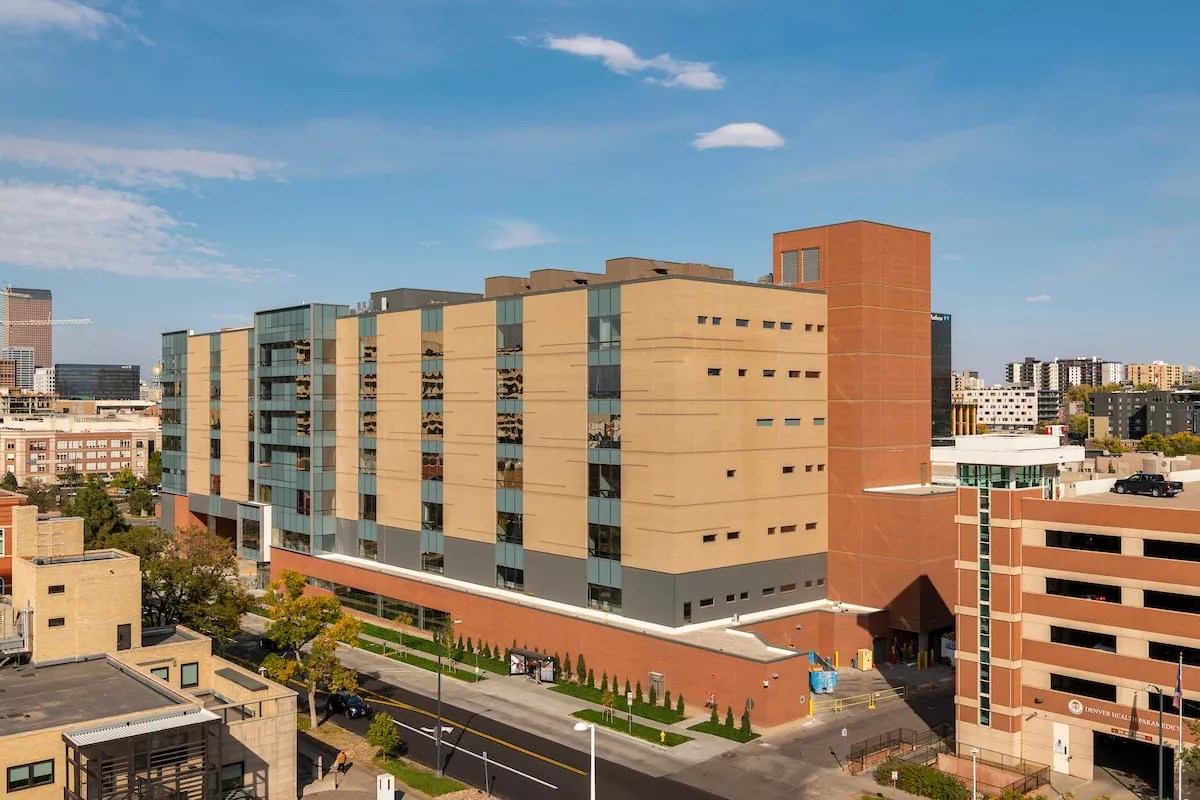
Denver Health

Audio By Carbonatix
Even though Denver Health has been a foundation of the city since the hospital was established in 1860, it needs more funding in order to fulfill its mission of offering free care for all Denver residents, regardless of insurance status.
In November, Denver voters will decide on Ballot Question 2Q, a .34 percent sales tax that would raise $70 million a year to help fund Denver Health. Supporters, including nearly all the members of Denver City Council, say that Denver Health urgently needs the funding because of a recent surge in uninsured or underinsured patients who can’t pay their hospital bills.
According to the City of Denver, the majority of patients are uninsured or underinsured, including Venezuelan migrants, and more and more patients are seeking its “uncompensated care.”
Denver Health has provided $100 million worth of uncompensated care to residents during the past two years, and expects to offer another unreimbursed $124 million in care in 2025. That’s compared with $60 million of uncompensated care in 2020, according to Denver Health. Last year, Denver Health had a $1.4 billion budget, nearly the size of the City of Denver’s 1.6 billion budget in 2023.
“Yes on 2Q shows that you care about your community,” wrote Donna Lynne, the CEO of Denver Health and former lieutenant governor of Colorado, in an opinion column published on westword.com. “Yes on 2Q strengthens the city’s health-care system that provides high-quality care for those in need, whenever and wherever they need it.”
Denver General Hospital was a city department until 1996, when the city moved it to independent-agency status as the Denver Health and Hospital Authority. Since then, DHHA has had to negotiate with the city each year for funding for the hospital at 777 Bannock Street as well as other services, but Denver hasn’t increased the $30 million annual allocation from its general fund since 1996, according to Lynne.
At a July 17 Denver City Council meeting, Lynne said that a tax is the quickest way to increase Denver Health’s funding. Since 1996, the city share of the payments for Denver Health – despite health-care inflation, wage increases, more patients, more uninsured – that really hasn’t been met,” she added. “We didn’t just wake up and decide to do this. The vibrancy of the city, the ability to graduate young people from school, to provide a healthy workforce, is very much in Denver Health’s lap. We’re one of the few remaining hospitals and health-care systems in the city and county of Denver.”
According to Healing Denver, the campaign pushing 2Q, the hospital needs that additional revenue to hire more staff for its emergency and trauma care, primary medical care, mental health care, drug and alcohol use recovery and pediatric care. If the tax doesn’t pass, the hospital will need “to significantly reduce operating costs” in those areas, including cutting some of its 8,200 staff members.
Denver City Council sent 2Q to the ballot by a 12-1 vote on July 25. The only opposing vote came from Councilman Kevin Flynn, who wants Denver to avoid increasing its sales tax.
“It brings me no enjoyment…I understand completely the need at Denver Health for additional revenue,” Flynn said at a June council meeting.”I’m just disappointed that we continue to turn reflexively to the sales tax to fund things like this. Sales tax is the most regressive form of taxation. It hits lower-income families to a greater degree.”
The Denver Health tax would exempt only a few items, primarily food and beverages.
Councilwoman Flor Alvidrez, who supports 2Q, responded to Flynn, saying that she agrees with his concern over raising the sales tax but that Denver urgently needs more funding for the hospital.
“I definitely would love to see a regional approach or another way to do this, but this is urgent and we need something now,” Alvarez says. “Our funding of Denver Health has been stagnant, and we can’t wait and depend on that funding increasing another way. I think if there was another way, we would be looking at that.”
Alvidrez did oppose putting the half-cent Affordable Denver tax on the ballot, saying that she didn’t want to add another “regressive sales tax.”
With the eight special sales taxes that Denver already has in place, the city’s current tax rate is 8.81 percent. The Denver Health tax would raise it to 9.14 percent. If the sales tax proposal geared to affordable housing also passes, the rate would jump to 9.64 percent, passing Boulder on the list of cities with the highest sales tax rates along the Front Range, according to the Common Sense Institute.